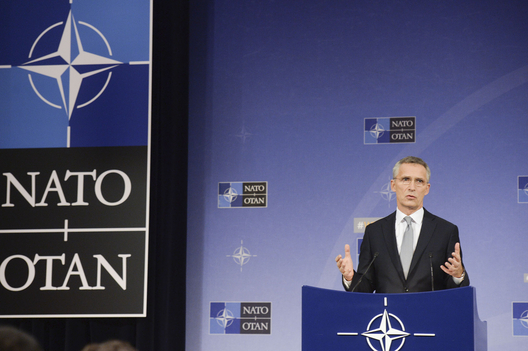 [W]e discussed ways to strengthen our cyber defences. We must be just as effective in the cyber domain as we are on land, at sea and in the air, with real-time understanding of the threats we face and the ability to respond however and whenever we choose. Today, ministers agreed on the creation of a new Cyber Operations Centre as part of the outline design for the adapted NATO Command Structure. This will strengthen our cyber defences, and help integrate cyber into NATO planning and operations at all levels. We also agreed that we will be able to integrate Allies’ national cyber capabilities into NATO missions and operations. While nations maintain full ownership of those capabilities. Just as Allies own the tanks, the ships and aircraft in NATO missions.
[W]e discussed ways to strengthen our cyber defences. We must be just as effective in the cyber domain as we are on land, at sea and in the air, with real-time understanding of the threats we face and the ability to respond however and whenever we choose. Today, ministers agreed on the creation of a new Cyber Operations Centre as part of the outline design for the adapted NATO Command Structure. This will strengthen our cyber defences, and help integrate cyber into NATO planning and operations at all levels. We also agreed that we will be able to integrate Allies’ national cyber capabilities into NATO missions and operations. While nations maintain full ownership of those capabilities. Just as Allies own the tanks, the ships and aircraft in NATO missions.
NATO is a defensive alliance, whose actions are always subject to strict political oversight and always act in accordance with international law….
We will integrate national cyber capabilities into NATO missions and operations as we integrate their conventional capabilities, being it ships, tanks, planes. It will still be under full national control, it will be national capabilities but they will be integrated into NATO missions and operations. Let me also add that we have as part of our strengthening of our cyber defences we have also decided to establish or we have established cyber as a military domain and we have also decided that cyber attacks can trigger Article 5. So integrating national cyber effects into NATO missions and operations is yet another step to strengthen cyber in NATO.
Excerpts from press conference by Secretary General Jens Stoltenberg, November 8, 2017.
Image: Secretary General Jens Stoltenberg, Nov. 8, 2017 (photo: NATO)
